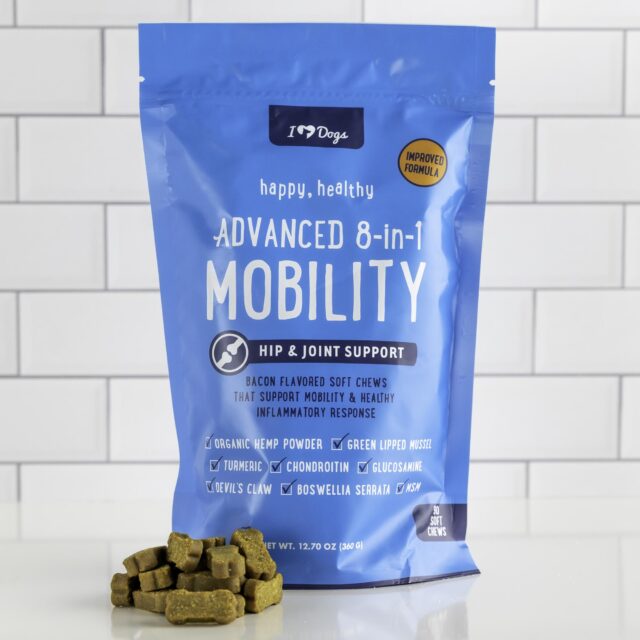Joint pain can make your furry friend quick to slow down, even when they should have a long, healthy life ahead of them. Seeing your dog suffer is heartbreaking, especially since dogs can’t tell us what’s wrong. Most canines can benefit from extra joint support, which can be found in ingredients like chondroitin for dogs.
Related: Best Chondroitin Supplements for Dogs
About one in five dogs face joint problems in their life. Their risk only increases as they age. The best way to relieve their joint pain is to choose the safest and most effective canine supplement. So, what is glucosamine and chondroitin for dogs, and how can they help your dog feel young again?

What is Chondroitin?
Chondroitin sulfate, more commonly known as chondroitin, is a type of glycosaminoglycan (GAG). GAGs are negatively-charged compounds that affect cell development, including regulating cell growth and repairing wounds. Chondroitin is a natural part of the connective tissue in humans and animals, which is found in cartilage.
Yet, dogs may not have enough chondroitin in their bodies to protect their joints from damage. Thus, it’s used for joint supplements because it provides shock absorption for your dog’s joints and keeps the tissues around the dog’s joints healthy. It can prevent areas of your dog’s body from becoming inflamed and enduring more damage.
Even though chondroitin is often used as an ingredient in dog food, supplements are the key to giving your dog the full benefits. Many companies sell canine joint supplements containing ingredients such as chondroitin, glucosamine, and MSM, but pay close attention to the ingredients to find the perfect product for your pup. Humans, dogs, cats, and horses can all benefit from this GAG’s properties.
Where Does Chondroitin Come From?
Since it’s found in cartilage, the chondroitin in joint supplements comes from animal sources. The most common are cow, pig, or shellfish cartilage. Shark cartilage is sometimes used in products, but it’s not recommended because it can negatively impact the oceans.
The specific type of cartilage may not be listed on the packaging, but if it is, try to avoid shark products since your dog can get the same benefits from other sources. Chondroitin can be difficult to extract, which is why supplements containing high amounts of it may be pricy.

Chondroitin vs. Glucosamine for Dogs
Whenever you hear about chondroitin, the word glucosamine is also used with it. There are two common types of glucosamine: hydrochloride and sulfate. Both can be effective for joint health, but glucosamine hydrochloride has better stability and purity. Also, more studies have been done for glucosamine hydrochloride than glucosamine sulfate.
Glucosamine hydrochloride is a naturally occurring compound that’s found in your dog’s connective tissue. While chondroitin can prevent damage from occurring to joints, glucosamine can help build new cartilage.
So, many joint supplements use both glucosamine and chondroitin for dogs to give them the most positive effects. These ingredients may not cure more severe conditions like arthritis, but they can prevent it and significantly reduce the pain.
Related: 12 Best Dog Breath Fresheners
How Can Chondroitin Benefit Dogs?
The most common benefit of chondroitin for dogs is joint health. It can soothe your pet’s pain, reduce arthritis symptoms, and give them increased mobility in their joints. It will prevent your dog from slowing down as quickly, allowing them to feel young and energetic again.
With better mobility, dogs can exercise and play more, improving their strength and reducing the risk of obesity. Chondroitin focuses on cartilage health to reduce pain and damage to your dog’s joints.
Here are the main benefits of chondroitin for dogs:
- Prevents the white blood cell enzymes that harm cartilage
- Helps cartilage absorb the necessary nutrients
- Stimulates cartilage synthesis
There is some controversy around chondroitin for dogs because few studies have been centered around it. Some studies on chondroitin and glucosamine haven’t concluded that the substances benefit every dog. It’s difficult to tell which dogs they will be most effective on.
However, most vets still recommend chondroitin because it has helped many dogs, and even if it doesn’t make a huge difference, there are few risks involved. Plus, it’s a good alternative for dogs who can’t handle the side effects of non-steroidal anti-inflammatory drugs (NSAIDs).

How Does Chondroitin Work?
Canine joints are protected by capsules that are filled with water. The more liquid that surrounds the joint, the more protected it will be. When dogs consume chondroitin, those capsules are strengthened, increasing water retention in the capsules. It improves the elasticity and quality of the cartilage, making it easier for your dog to move freely. It also nourishes the tissue around joints.
Cartilage is like padding for your dog’s joints. It cushions your dog’s bones when they exercise or jump down from objects. Chondroitin protects the cartilage in your dog’s body to ensure it doesn’t deteriorate and cause the bare bones to connect. Less cartilage around your dog’s joints means your dog could feel pain every time they’re active.
Chondroitin and glucosamine are the perfect duo for battling joint problems. While chondroitin fights off sources damaging your dog’s joints, glucosamine can repair anything that has already been harmed. So, it’s best to start giving your dog joint supplements before any severe damage occurs.
Young, healthy animals can naturally keep their cartilage in shape, but it’s hard for their cartilage to keep up with their bodies as they age. Thus, joint damage occurs, which is why chondroitin and glucosamine are essential for fighting wear and tear.
Why Are Some Researchers Skeptical?
Even though many dogs have experienced improvements after taking chondroitin, some scientists believe there needs to be more evidence. Not many studies have been done about dogs and chondroitin, and the studies that have been completed didn’t confirm that they’re effective for most dogs.
The reason there aren’t many experiments testing chondroitin’s effectiveness is that chondroitin and glucosamine can’t be patented. Neither are labeled as drugs, so they’re not regulated by the FDA. Thus, pharmaceutical companies can’t make as much money off them as they can for other supplements. So, they may not be interested in funding more research on them.
Chondroitin and glucosamine are labeled as “nutraceuticals,” which are naturally occurring substances that fall under the same category as vitamins. Even though the FDA doesn’t control nutraceuticals, these substances have minimal risks. They may help your dog’s joints immensely, but even if they don’t have an effect, they won’t negatively impact your pup either.

Signs Your Dog Needs Joint Supplements
If your dog is slowing down, it might not be a sign of getting older. Many dogs don’t move around as well as they used to because they’re experiencing joint problems, but they can’t tell their humans what’s wrong. You’d be surprised how much a supplement can improve your dog’s activity levels.
Here are some signs that your dog needs more chondroitin:
- Stiffness
- Limping
- Trouble climbing stairs
- Slow to stand or walk
Dogs who exhibit any of the above issues will benefit from joint supplements. However, you don’t need to wait until your dog is suffering to add beneficial ingredients to their diets. Chondroitin can prevent future problems from occurring, so it’s great for healthy dogs too.
If you’ve never given your dog a joint supplement before, you should talk to your vet first, especially if your dog is exhibiting any symptoms. Your vet can confirm if your dog’s symptoms are just a result of joint pain or if they’re linked to something more serious. Then, they can suggest the proper supplements or treatments based on what they discover.
Common Areas of Dog Joint Pain
When dog parents think about joint pain, they commonly associate it with their dog’s knees and elbows. But dog joints can deteriorate in several places throughout the body. In addition to the joints in their legs, they could also experience damage in their shoulders, hips, and intervertebral joints, which are the joints located between the vertebrae on their spine.
Large dog breeds, such as Labrador Retrievers and German Shepherds, are the most likely to get arthritis. Dachshunds are also at high risk due to their unique body shapes. However, any dog can suffer from joint concerns, especially if they’re old or overweight.

How to Prevent Arthritis
Chondroitin is a great way to prevent the pain of joint problems like arthritis in dogs. Yet, there are other ways to protect them in addition to supplements. Avoiding unnecessary stress on their joints and keeping them a healthy weight are easy ways to reduce the risk.
The older your dog gets, the more crucial these preventative measures become. There’s no way to cure a dog who has arthritis, which is why early prevention is critical.
How Much Chondroitin for Dogs is Safe?
Most joint supplements that contain chondroitin will have the dosage information on the packaging. However, it’s important to be cautious when giving your dog a dose of something new. The exact amount will vary significantly based on your dog’s size and the severity of their joint problems.
Recommended Chondroitin Dosage for Dogs
How much glucosamine and chondroitin for dogs can vary because it’s unlikely that you’d serve either ingredient by itself. Instead, you’ll probably give it to your dog as a supplement, which includes several items for joint relief. So, the dosage can differ based on what the supplements include.
The average chondroitin dosage consists of 900 mg for dogs under 80 pounds and 1,800 mg for dogs over 80 pounds. You should adjust the dose slightly based on where your dog falls in those age ranges. When in doubt, start with a lower dose to ensure your dog doesn’t have any reactions to it.
Talking to your vet is always a great place to start. They can inform you of which joint supplements will be best for your dog’s specific needs, along with how much you should give your furry friend.

How Long Will it Take Chondroitin to Work?
Most supplements should be taken consistently for a few weeks before significant changes occur. So, it may take a while before you know if it’s working. It could take about four to eight weeks for your pup to reap the full benefits.
Less limping, a normal gait, more thigh muscle mass, and a better range of motion are all signs that the chondroitin dosage is working for your dog. Vets recommend that you keep giving your dog the supplements for three months before evaluating the results.
If there are no positive changes after three months of taking the supplements, you may need to discuss other options with your vet. Even though chondroitin seems to benefit most dogs, no supplement is a guaranteed fix for every pup.
Chondroitin Risks for Dogs
Luckily, chondroitin is very safe for dogs and has few side effects. Yet, like all new supplements, there are risks to be aware of. Some dogs may experience digestive problems, such as vomiting or diarrhea, when they start taking a new supplement, but those symptoms are unlikely to persist. Even though there is glucose in GAGs, chondroitin doesn’t negatively impact blood sugar regulation.
Dogs who overdose may experience insomnia, fatigue, excessive thirst, or increased urination. As long as you don’t go above the recommended dose, these side effects are rare. Store the supplements somewhere your dog can’t reach them just to be safe.
In some cases, companies may use artificial dyes and preservatives to make products seem more appealing. Yet, these items provide no nutritional properties and could make dogs sick. So, if you see any unnecessary additives in the ingredient list, find a better quality supplement. Also, pay attention to calories. Some treat-like supplements may be high in calories, especially for dogs who need larger doses.
Like all supplements, allergies can be a concern. If your dog has an allergy to certain animal sources, such as shellfish, you’ll need to be more cautious about the type of chondroitin you select. Also, never give your dog chondroitin supplements that are intended for humans.

Are There Any Drug Interactions?
Chondroitin sulfate is not known to interfere with any other drugs. Even so, you should tell your vet what other medications your dog is currently taking before giving them a joint supplement too. You do not need a prescription to get a chondroitin product.
What is the Best Glucosamine Chondroitin Supplement for Dogs?
Glucosamine chondroitin for dogs has become increasingly popular in recent years, so there are a lot of options on the market. Some supplements are great for joint relief, while others don’t do as much. Look closely at the ingredient list to find a brand you can trust.
Most joint supplements for dogs come in pills or treats, but some liquid and powder versions exist too. The problem with pills and tablets is that picky dogs are reluctant to take them. Yet, if you’re able to hide them in peanut butter or a pill pocket, they can be great for your pup’s joint health.
In extreme cases, vets may offer a chondroitin injection to treat degenerative disc disease. Yet, it’s rare that professionals will suggest this option for your furry friend.
Chews that look and smell like treats, such as the Trader Joe’s glucosamine chondroitin for dogs, are becoming more popular for many pet parents. Dogs are less likely to resist them because they seem appealing, but they often have the same benefits as other forms of glucosamine chondroitin supplements. Most of these supplements are suitable for dogs of all life stages.
Before choosing which joint product is best for your pup, compare the labels on all the options you’re considering. Some may contain less chondroitin than others, making it less effective. When in doubt, ask your vet for their recommendation of the best glucosamine chondroitin for dogs.
A Tasty Treat!
If you have a picky pup, you might want to consider using tasty treats to give them the joint relief they need. Before choosing the perfect product, look closely at the ingredients to ensure they’re made by a company you can trust.
The iHeartDogs Advanced 8-in-1 Hip & Joint Chews can help canines of all ages have healthier joints. They can reduce joint inflammation, prevent cartilage damage, and improve your pup’s mobility. Your furry friend may feel younger and more energetic after taking them.
Some of the beneficial ingredients in these treats include glucosamine HCI, chondroitin, MSM, omega-rich organic hemp powder, green-lipped mussels, organic turmeric, and Boswellia serrata. All these items have properties that can keep your dog’s joints healthy long-term. Plus, each bag purchased donates 14 meals to shelter dogs. So, not only will you be protecting your own pup, but you’ll be helping animals in need, too.
Joint pain can cause your dog to age faster than it would otherwise. No one wants to watch their dog struggle to run and play, which is why chondroitin for dogs is a great way to prevent damage. There are many joint supplements that use chondroitin, so it’s up to you to decide which one is best for your canine companion.

 Toledo, United States.
Toledo, United States.